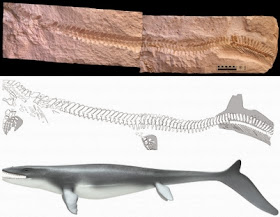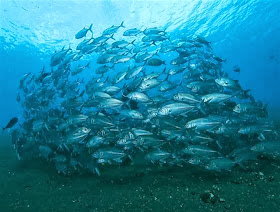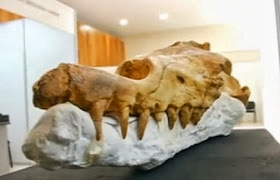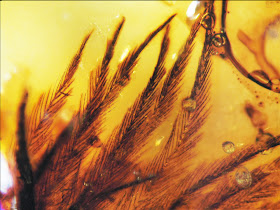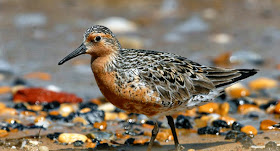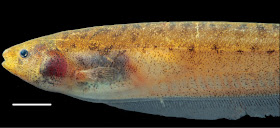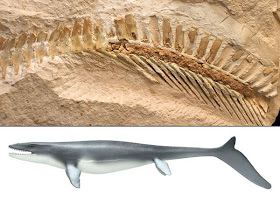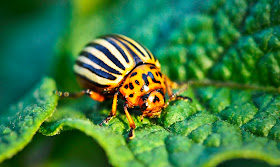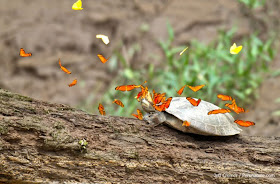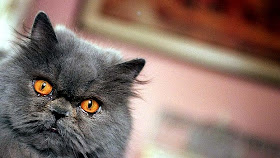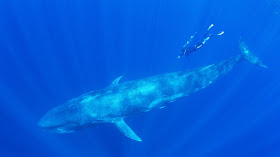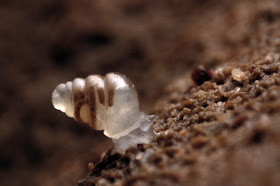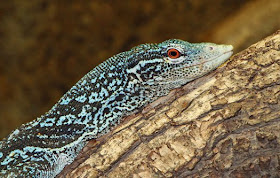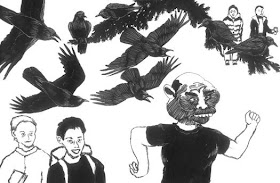Until now it was thought havøglene had fish-like, but with long narrow body without caudal fin, and they made their way into the water by meander forward, like an eel. Now scientists might reconsider sight.
It was an international research team, led by Swedish researcher at Lund University, Johan Lindgren, who discovered a clear imprint of a fish-like tail fin of the prehistoric Mosasaurs Prognathodon.
Source: Here
Sunday, September 22, 2013
Tiger Genome Sequenced, Shows Big Cats Evolved to Kill
The first sequenced tiger genome shows that big cats evolved to kill.
Genes for strong muscle fibers and for meat-eating appear narrowly shared, researchers reported, among species as distinct as the African lion and Asia's snow leopard.
Scientists mapped the genes of the endangered Siberian tiger (or Amur tiger), both to understand the genes that make big cat species distinct from one another and to aid efforts to preserve genetic diversity in wild tiger populations. (Also see "Isolated Tigers Travel Surprising Lands to Find Mates.")
Source: Here
Genes for strong muscle fibers and for meat-eating appear narrowly shared, researchers reported, among species as distinct as the African lion and Asia's snow leopard.
Scientists mapped the genes of the endangered Siberian tiger (or Amur tiger), both to understand the genes that make big cat species distinct from one another and to aid efforts to preserve genetic diversity in wild tiger populations. (Also see "Isolated Tigers Travel Surprising Lands to Find Mates.")
Source: Here
Embryonic photographs of animals
These amazing pictures of young dolphins, sharks, dogs, penguins and elephants are part of the film «Extraordinary Animals in the Womb» Production National Geographic Channel and the British Channel4. The film Peter Chinn used modern high definition cameras, infrared technology, the 4-D scans, and a lot of computer-generated models. The result is a most detailed embryonic animal pictures ever made.
Source: Here
Source: Here
These
amazing pictures of young dolphins, sharks, dogs, penguins and
elephants are part of the film «Extraordinary Animals in the Womb»
Production National Geographic Channel and the British Channel4. The
film Peter Chinn used modern high definition cameras, infrared
technology, the 4-D scans, and a lot of computer-generated models. The
result is a most detailed embryonic animal pictures ever made. - See
more at:
http://xgoweb.com/the-art-of-science-science-photo/#sthash.GqkK6R0I.dpuf
These
amazing pictures of young dolphins, sharks, dogs, penguins and
elephants are part of the film «Extraordinary Animals in the Womb»
Production National Geographic Channel and the British Channel4. The
film Peter Chinn used modern high definition cameras, infrared
technology, the 4-D scans, and a lot of computer-generated models. The
result is a most detailed embryonic animal pictures ever made. - See
more at:
http://xgoweb.com/the-art-of-science-science-photo/#sthash.GqkK6R0I.dpuf
Why fish don't need to be schooled in the art of swimming
How do fish swim in schools, effortlessly coordinating their every move? The answer appears to be ingrained in their genes.
The genetic basis underlying the complex, social behavior of schooling is revealed in two studies published Sept. 12 in the journal Current Biology. The studies suggest that schooling is not a learned behavior, and instead show it relies on several regions of the fish genome.
Source: Here
The genetic basis underlying the complex, social behavior of schooling is revealed in two studies published Sept. 12 in the journal Current Biology. The studies suggest that schooling is not a learned behavior, and instead show it relies on several regions of the fish genome.
Source: Here
News in Brief: Mice lose cat fear for good after infection
Mice may permanently shed a fear of felines when infected with a parasite. The effects linger long after the parasites disappear, a study shows.
The protozoan parasite Toxoplasma gondii can infect most mammals, including humans (SN: 1/26/13, p. 24). But the parasite can reproduce only in the feline gut, so cats need to eat animals infected with T. gondii to keep the parasite generations going.
Source: Here
The protozoan parasite Toxoplasma gondii can infect most mammals, including humans (SN: 1/26/13, p. 24). But the parasite can reproduce only in the feline gut, so cats need to eat animals infected with T. gondii to keep the parasite generations going.
Source: Here
Peru discovers whale fossils in desert dating back 40 million years
A team of palaeontologists have unearthed a trove of ancient whale fossils, believed to be more than 40 million years old, in Peru’s Ocucaje desert.
The discovery provides new evidence of the evolutionary link between sea mammals and their land-dwelling ancestors.
Source: Here
The discovery provides new evidence of the evolutionary link between sea mammals and their land-dwelling ancestors.
Source: Here
Climate change pushing lobster north, study says
Climate change is a big factor for lobsters and other marine species moving north in large numbers, according to new research published in the journal Science, co-authored by a Halifax university professor.
The study, co-authored by Dalhousie University marine biology professor Dr. Boris Worm, compiled 40 years worth of data to explain several significant marine species shifts seen in the Atlantic and Pacific oceans.
Source: Here
The study, co-authored by Dalhousie University marine biology professor Dr. Boris Worm, compiled 40 years worth of data to explain several significant marine species shifts seen in the Atlantic and Pacific oceans.
Source: Here
Jurassic jaws: how ancient crocodiles flourished during the age of the dinosaurs
New research has revealed the hidden past of crocodiles, showing for the first time how these fierce reptiles evolved and survived in a dinosaur dominated world.
While most modern crocodiles live in freshwater habitats and feed on mammals and fish, their ancient relatives were extremely diverse – with some built for running around like dogs on land and others adapting to life in the open ocean, imitating the feeding behaviour of today's killer whales.
Source: Here
While most modern crocodiles live in freshwater habitats and feed on mammals and fish, their ancient relatives were extremely diverse – with some built for running around like dogs on land and others adapting to life in the open ocean, imitating the feeding behaviour of today's killer whales.
Source: Here
New rat genus discovered in the birthplace of the theory of evolution
New rat genus A prominent tuft of spiny hair on the back, a white tail tip and three pairs of teats represent the unique set of characteristics describing a new genus of rat which has been discovered in the Moluccan province of Indonesia. This region had a profound influence on the British Naturalist Alfred Russell Wallace who independently developed the theory of evolution alongside Charles Darwin. The international team of zoologists was led by the Museum Zoologicum Bogoriense in Indonesia and the Center for Macroecology, Evolution and Climate at the University of Copenhagen
One hundred years after the death of Sir Alfred Russel Wallace, an international team of zoologists has discovered a new genus of mammal in the Halmahera Island in Indonesia. It is located in Wallacea, an Eastern Indonesian region named after the British Naturalist himself. The team was surprised to find the new endemic rodent close to the locality of Boki Mekot, a mountainous area under severe ecological threat due to mining and deforestation.
Source: Here
One hundred years after the death of Sir Alfred Russel Wallace, an international team of zoologists has discovered a new genus of mammal in the Halmahera Island in Indonesia. It is located in Wallacea, an Eastern Indonesian region named after the British Naturalist himself. The team was surprised to find the new endemic rodent close to the locality of Boki Mekot, a mountainous area under severe ecological threat due to mining and deforestation.
Source: Here
Dinosaur Feathers Found in Ancient Amber
Instead of digging through rocks and rubble to find fossils, a group of Canadian paleontologists decided to dig through museums’ amber collections instead. Their unique approach paid off when they discovered feathers and never-before-seen structures, which they think are something called dinofuzz. As described in Science Now,
Source: Here
Source: Here
Conservationists deploy net-flinging cannons, GPS devices to aid restoration of endangered bird
To save one critically endangered bird population, a group of researchers are bringing in the big guns—literally. The researchers deployed a trio of cannons into areas of Cape Cod, Massachusetts, where populations of the red knot, a robin-sized bird species, are roosting and fire nets from the cannons to trap the birds in order to collect feather samples and outfit the birds with geo-locator devices. By tracking the birds via the devices, the researchers hope to gather clues that might help them save this bird species from what some ornithologists say is a very likely extinction.
According to the research team, which included about a dozen participants, the red knot is one of a large number of shorebirds that are in trouble—70% of shorebird species are in decline, according to Lawrence Niles, a participant and the chief biologist at the Conserve Wildlife Foundation. The red knot’s problem is especially acute, though, in that some of its populations have withered by 75% since the 1980s.
Source: Here
According to the research team, which included about a dozen participants, the red knot is one of a large number of shorebirds that are in trouble—70% of shorebird species are in decline, according to Lawrence Niles, a participant and the chief biologist at the Conserve Wildlife Foundation. The red knot’s problem is especially acute, though, in that some of its populations have withered by 75% since the 1980s.
Source: Here
Thursday, September 19, 2013
4 Legless Lizard Species Discovered in California
Four previously unknown species of snakelike creatures have been found in California — but don't call them snakes; they're legless lizards. Prior to the discovery of the new species, there was only one known legless lizard species in the United States: the California legless lizard.
Surprisingly, the newfound legless lizards were discovered at a series of sites that weren't exactly pristine: They include a dune bordering a runway at Los Angeles International Airport; an empty lot in downtown Bakersfield, Calif.; a field littered with oil derricks; and the margins of the Mojave Desert.
Source: Here
Surprisingly, the newfound legless lizards were discovered at a series of sites that weren't exactly pristine: They include a dune bordering a runway at Los Angeles International Airport; an empty lot in downtown Bakersfield, Calif.; a field littered with oil derricks; and the margins of the Mojave Desert.
Source: Here
Wednesday, September 18, 2013
Two New Species of Electric Knifefishes Discovered in Central Amazon
These species – Brachyhypopomus bennetti and Brachyhypopomus walteri – are weakly electric relatives of South America’s famous electric eel (Electrophorus electricus) that can produce strong electric discharges of up to 600 volts.
By contrast, the new species produce pulses of only a few hundred millivolts from an organ under the body that extends out onto a filamentous tail.
Source: Here
By contrast, the new species produce pulses of only a few hundred millivolts from an organ under the body that extends out onto a filamentous tail.
Source: Here
Shark-like Tails Sped Ancient Sea Monsters Through Oceans
Sea monsters lying in wait for unsuspecting prey sounds scary enough. But slap on a tail that let them run down their dinner—much like today's great white sharks—and mosasaurs could truly be considered one of the ancient world's nightmares.
And that's exactly what a new study published September 10 in Nature Communications has confirmed.
Source: Here
And that's exactly what a new study published September 10 in Nature Communications has confirmed.
Source: Here
Beetles trick plants with microbe-laced vomit
Bacteria living inside Colorado potato beetles can fool plants into thinking they’re being attacked by a microbe, rather than a chewing herbivore.
Beetles don’t have salivary glands and so they regurgitate oral secretions onto leaves to begin digestion. These secretions contain gut bacteria.
Source: Here
Beetles don’t have salivary glands and so they regurgitate oral secretions onto leaves to begin digestion. These secretions contain gut bacteria.
Source: Here
Amazonian Butterflies Drink Turtle Tears
The sight of butterflies flocking onto the heads of yellow-spotted river turtles in the western Amazon rain forest is not uncommon, at least if one is able to sneak up on the skittish reptiles. But the reason why butterflies congregate onto the turtles may be stranger than you think: to drink their tears.
The butterflies are likely attracted to the turtles' tears because the liquid drops contain salt, specifically sodium, an important mineral that is scant in the western Amazon, said Phil Torres, a scientist who does much of his research at the Tambopata Research Center in Peru and is associated with Rice University.
Source: Here
The butterflies are likely attracted to the turtles' tears because the liquid drops contain salt, specifically sodium, an important mineral that is scant in the western Amazon, said Phil Torres, a scientist who does much of his research at the Tambopata Research Center in Peru and is associated with Rice University.
Source: Here
Found: The First Mechanical Gear in a Living Creatur
With two diminutive legs locked into a leap-ready position, the tiny jumper bends its body taut like an archer drawing a bow. At the top of its legs, a minuscule pair of gears engage—their strange, shark-fin teeth interlocking cleanly like a zipper. And then, faster than you can blink, think, or see with the naked eye, the entire thing is gone. In 2 milliseconds it has bulleted skyward, accelerating at nearly 400 g's—a rate more than 20 times what a human body can withstand. At top speed the jumper breaks 8 mph—quite a feat considering its body is less than one-tenth of an inch long.
This miniature marvel is an adolescent issus, a kind of planthopper insect and one of the fastest accelerators in the animal kingdom. As a duo of researchers in the U.K. report today in the journal Science, the issus also the first living creature ever discovered to sport a functioning gear. "Jumping is one of the most rapid and powerful things an animal can do," says Malcolm Burrows, a zoologist at the University of Cambridge and the lead author of the paper, "and that leads to all sorts of crazy specializations."
Source: Here
This miniature marvel is an adolescent issus, a kind of planthopper insect and one of the fastest accelerators in the animal kingdom. As a duo of researchers in the U.K. report today in the journal Science, the issus also the first living creature ever discovered to sport a functioning gear. "Jumping is one of the most rapid and powerful things an animal can do," says Malcolm Burrows, a zoologist at the University of Cambridge and the lead author of the paper, "and that leads to all sorts of crazy specializations."
Source: Here
Tiger genome to help big-cat conservation
PARIS — South Korean scientists said on Tuesday they had carried out the first DNA analysis of the tiger and four other great felines in a project to help critically-endangered cats to survive.
A team led by Jong Bhak of the Personal Genomics Institute in Suwon unravelled the genome of the Amur tiger, and compared it against those of a white Bengal tiger, the African lion, a white African lion and the snow leopard.
Source: Here
A team led by Jong Bhak of the Personal Genomics Institute in Suwon unravelled the genome of the Amur tiger, and compared it against those of a white Bengal tiger, the African lion, a white African lion and the snow leopard.
Source: Here
Birds Evolved from Maniraptoran Dinosaurs: Study
Researchers from McGill University say that birds have evolved from a group of small, meat-eating theropod dinosaurs called maniraptorans that existed about 150 million years ago.
Many maniraptorans were bird-like as they had small body sizes along with hollow bones, feathers, and high metabolic rates, according to the findings of the researchers.
Source: Here
Many maniraptorans were bird-like as they had small body sizes along with hollow bones, feathers, and high metabolic rates, according to the findings of the researchers.
Source: Here
PETA Allegedly Exposes Grisly, 'Primitive and Painful Killing' Methods Used in Maine Lobster Processing Facility With Undercover Footage (VIDEO)
New disturbing footage from PETA allegedly exposes a Maine lobster processing facility and its grisly treatment of its animals. (Photo : wikicommons)
A video secretly shot by an undercover member of PETA allegedly exposes a Maine lobster processing facility's grisly, illegal methods in killing their crustaceans, and the controversial animal rights organization is outraged, the Portland Press Herald reports.
Source: Here
A video secretly shot by an undercover member of PETA allegedly exposes a Maine lobster processing facility's grisly, illegal methods in killing their crustaceans, and the controversial animal rights organization is outraged, the Portland Press Herald reports.
Source: Here
Tuesday, September 17, 2013
Iran looks to send Persian cat into space
Iran has settled on a Persian cat as the best candidate for its latest trial for a manned space mission it hopes to make by 2020, state media reports.
The feline would be following in the footsteps of a menagerie of dogs and monkeys who were among the early stars of the US and Soviet space programs in the 1960s.
Source: Here
The feline would be following in the footsteps of a menagerie of dogs and monkeys who were among the early stars of the US and Soviet space programs in the 1960s.
Source: Here
Ear Wax From Whales Keeps Record Of Ocean Contaminants
How often do whales clean their ears? Well, never. And so, year after year, their ear wax builds up, layer upon layer. According to a study published Monday, these columns of ear wax contain a record of chemical pollution in the oceans.
The study used the ear wax extracted from the carcass of a blue whale that washed ashore on a California beach back in 2007. Scientists at the Santa Barbara Museum of Natural History collected the wax from inside the skull of the dead whale and preserved it. The column of wax was almost a foot long.
Source: Here
The study used the ear wax extracted from the carcass of a blue whale that washed ashore on a California beach back in 2007. Scientists at the Santa Barbara Museum of Natural History collected the wax from inside the skull of the dead whale and preserved it. The column of wax was almost a foot long.
Source: Here
Monday, September 16, 2013
Slow-motion world for small animals
Smaller animals tend to perceive time as if it is passing in slow motion, a new study has shown.
This means that they can observe movement on a finer timescale than bigger creatures, allowing them to escape from larger predators.
Source: Here
This means that they can observe movement on a finer timescale than bigger creatures, allowing them to escape from larger predators.
Source: Here
New Snail Species with Semi-Transparent Shell Discovered in Croatia
The Lukina Jama–Trojama is the deepest cave system in Croatia. It is well known for its vertical shape, long pits and great depth of about 1.4 km.
The new species, named Zospeum tholussum, is a tiny and fragile snail with a beautifully shaped dome-like semi-transparent shell.
Souce: Here
The new species, named Zospeum tholussum, is a tiny and fragile snail with a beautifully shaped dome-like semi-transparent shell.
Souce: Here
Orangutans found to plan, communicate future routes
Male orangutans plan their travel route up to a day in advance and communicate it to other orangutans, research indicates.
Anthropologists at the University of Zurich found that wild-living orangutans make use of the planning ability to attract females and repel male rivals.
Source: Here
Anthropologists at the University of Zurich found that wild-living orangutans make use of the planning ability to attract females and repel male rivals.
Source: Here
Infected Monkeys On The Loose In Florida
(WILDLIFE) FLORIDA — It started with three Rhesus monkeys, and now more than a thousand are living freely in the sunshine state. Because many of the animals are infected with the herpes-B virus, wildlife officials are now calling the monkeys a public health hazard—all because a tour guide snatched them from their home and brought them to Ocala, Florida to entertain tourists on his Jungle Cruise ride. Native to Asia, Rhesus monkeys are highly social and easily adapt to many habitats, including Florida. Only now, the little guys are being accused of terrorizing the state—just one more reason why we shouldn’t uproot wildlife for our own amusement. Continue reading for more on these Old World animals. — Global Animal
Source: Here
Source: Here
Dog Houses and Dog House Plans
While the average dog owner would be quick in considering pre-made dog houses as the best dog house options available, there’s actually more to dog houses than the pre-made, easy to set up and ready for occupancy variety.
Custom-made dog houses actually have their own growing line of followers, with such products tailor-cut and specified to fit with the particulars of a given canine, regardless of size, age or breed.
If you happen to be in search for the best dog house for your best friend, don’t turn your back on the upsides of custom dog houses and the importance of dog house plans.
Dog Houses and Dog House Plans
As with any construction project, the making of a custom dog house begins with a dog house plan, a blueprint that’s made around the particulars and specifics of a given canine.
While many would be quick in dismissing the blueprint drafting process involved in the making of custom dog houses, their creation is actually more than just a step-up guide for carpenters and artisans, with their drafting also affording dog owners with essential cost estimates and completion date projections.
A dog house plan also helps dog owners take a firm hold on the type of materials which would be used in their making, giving them the upper hand of being able to pick out what is available from what has to be ordered.
From hardcopy blueprints to digitally rendered plans, a custom dog house need to have its own blueprints and plans for them to be of relevance to dogs and their owners alike.
Listing white rhinos as endangered could save all rhinos, conservationists say
The measure will put under the act’s protection the last remaining unprotected species of rhinoceros, a move that the organization says could help protect the other four highly endangered species of rhinos – black, Sumatran, Indian, and Javan – from poaching.
The southern white rhino is not as close to extinction as its four cousins, with about 20,000 white rhinos in protected areas and private game reserves in four countries: South Africa, Namibia, Zimbabwe, and Kenya. (The southern white rhino is actually a subspecies of white rhino; its northern counterpart is believed extinct in the wild.)
Source: Here
The southern white rhino is not as close to extinction as its four cousins, with about 20,000 white rhinos in protected areas and private game reserves in four countries: South Africa, Namibia, Zimbabwe, and Kenya. (The southern white rhino is actually a subspecies of white rhino; its northern counterpart is believed extinct in the wild.)
Source: Here
Friday, September 13, 2013
Choosing the right Cat Carrier
The question that asks “what’s the right cat carrier for my cat?” has been asked by cat owners at one point in time.
If you happen to be among the many wondering what deems a cat carrier the right one for your cat, below are two points worth looking into, in helping you determine which cat carrier option is best for you and your furry feline.
Understanding the need for cat carriers – Picking out the right cat carrier for your cat is not exactly rocket science, requiring only the most minimum understanding of a cat’s personality, as well as understanding what a cat carrier is for.
Unlike dogs, cats tend to be easily content when in confined spaces, making the necessity of getting bigger sized cat carriers subject to how one’s cat reacts to being enclosed, meaning one doesn’t have to get the biggest type of cat carrier case.
Convenience, not just for cats, but owners too – Many have made the mistake of focusing too much on their cats when in search for cat carriers, failing to consider just what their convenience points for cat owners are.
The aspect of a cat carrier’s “handling” is one good example in this regard, with many cat owners failing to consider if a given case is designed to be easy to bring about, not requiring two persons to carry it around.
Stackability is another consideration, something which cat owners should ask themselves when picking out a cat carrier.
Do well in remembering the above mentioned cat carrier considerations when in search for your cat’s right cat carrier type, and you won’t succumb to getting one that’s more of a problem, rather than a convenience.
The Best Students In The Animal Kingdom
The common chimpanzee is often held up as the most intelligent non-human primate--well, really, the most intelligent non-human animal--on the planet. But that ignores the brilliance of the common chimp's close relative: the bonobo.
Kanzi is probably the best-known bonobo in the world; now in her early 30s, Kanzi has exhibited the most linguistic abilities of any bonobo in history. Among her accomplishments are mastering Pac-Man, figuring out that toasting marshmallows over a fire is delicious, learning to communicate with both lexigrams and American Sign Language, and attempting to communicate vocally (although this is mostly incomprehensible, as bonobo vocal cords are very different from our own).
Source: Here
Reptile: Monitor Lizard
Monitor lizards, large and sometimes fearsome lizards common throughout
Africa, the Indian subcontinent, Southeast Asia, and Australasia, aren't
just big and scary: they're also among the fastest learners in the
reptile world. Monitor lizards have been proven to be able to count--not
just know which of a group has the highest number of objects, but to
know exactly which that number is. (You can read more about that
experiment here.)
Source: Here
Source: Here
Marine Mammal: Bottlenose Dolphin
No surprise here: the bottlenose dolphin is typically thought of as the
most intelligent non-human animal after the chimp and bonobo, and the
more research we do, the more impressive dolphins become. They've been
known to teach each other games and tricks, like walking on their tails
or blowing bubble rings; they can use tools (dolphins off the coast of
Australia learned to keep sponges over their noses to protect themselves
from spiny but delicious urchins); they've been trained by the navy; they've been proven to understand at least some elements of the concept of numbers.
However, it's difficult to measure the dolphin's intelligence due to
its capabilities as a mimic. Is it learning, or copying? Who knows?
Source: Here
Source: Here
Thursday, September 12, 2013
Blobfish wins ugliest animal vote
The grumpy-looking, gelatinous blobfish has won a public vote to become the official mascot of the Ugly Animal Preservation Society.
This gives the fish the unofficial title of world's ugliest animal.
The society began as a science-themed comedy night and devised its mascot campaign to draw attention to "aesthetically challenged" threatened species.
Source: Here
This gives the fish the unofficial title of world's ugliest animal.
The society began as a science-themed comedy night and devised its mascot campaign to draw attention to "aesthetically challenged" threatened species.
Source: Here
Cat Carrier Types – Hard Cat Carriers
Everyone knows how popular cats are as pets, with the fact that pet supplies and pet specialty stores are riddled with different pet accessories and grooming kits proves to back this fact.
When talking about pet supplies built specifically for cats, cat carriers are among the most commonly encountered, designed as cases which cat owners can utilize in transporting their felines from point A to point B.
The hard cat carrier variety of cat carriers remains to be one of the cat carrier types, made not just to “store” cats for trips, but also built to afford cats with ample protection from the rough rigors travelling can impose on them.
Hard Cat Carriers – Typically made with plastic and metal wire mesh components, hard cat carriers are generally built to be compact and sturdy carriers for cats.
From stackable cat carriers to dedicated single-item cases, hard cat carriers are typically sized to accommodate adult cats, with some designed with built-in feeding trays. Some are even designed with “indoor” litter boxes, with such spaces “compartmentalized” to suit a cat’s needs.
Generally, hard cat carriers are utilized by cat owners as a means of transporting their pets from the house to trips to the vet, but their use is not only limited for short term trips to certain destinations – at times even used in transporting cats from one city to another.
Often viewed as the general purpose cat carrier, hard cat carriers are essentially practical pet accessories to have handy in the house, useful and functional in securing a cat from external factors when necessary.
Fish: This One Goldfish
Fish are near-impossible to train; their brains work so differently from
ours that the typical way you'd train a dog or pig or parrot doesn't
really work. But after years of training, one British man managed to
train his goldfish to obey certain basic commands, like nudging a small
soccer ball into a goal. Read more about it (and see it in action) here.
Source: Here
Source: Here
Bird: Crow
Crows are noisy, scary-looking bullies, which, in the animal world, usually signals intelligence. The crow is perhaps the best problem-solver of the group, but it's also a very fast learner. In a recent experiment,
crows were found to remember and communicate the faces of individual
people who were thought of as a threat. By the end of the experiment,
the person who had wronged one crow found himself the enemy of all crows
on campus--even though he had interacted with hardly any of them.
Source: Here
Source: Here
Livestock: Pig
Of the most common livestock animals, bred into domesticity for milk or meat or fur, the pig is easily the fastest learner. The pig doesn't pass the famous mirror self-awareness test, but it can use the mirror to find the location of food that's out of sight--which might just mean the pig cares more about food than its own reflection.
Yet pigs are also incredibly quick learners, perhaps the fastest in the entire animal kingdom. From the NYTimes:
"They’ve found that pigs are among the quickest of animals to learn a new routine, and pigs can do a circus’s worth of tricks: jump hoops, bow and stand, spin and make wordlike sounds on command, roll out rugs, herd sheep, close and open cages, play videogames with joysticks, and more."
Source: Here
Dog: Border Collie
As we saw after meeting Chaser, the world's smartest dog, border collies can be frighteningly bright. Stanley Coren ranks them in his book The Intelligence of Dogs as the smartest breed, able to complete a series of cognition tests (learning names of objects, learning new tricks) more reliably than any other breed of dog.
Check out our feature on Chaser for more, but as a brief: Chaser has been able to learn over a thousand words, including names of objects and verbs, but also modifiers, like adjectives and adverbs, and prepositions. And she can make inferences and draw conclusions.
Source: Here
Cat: Abyssinian
Intelligence is hard or impossible to measure in most animals, but especially difficult to measure in felines, which are not pack animals and so have little interest in social hierarchies--which means they don't pay much attention to commands from us. Dogs, on the other hand, have instincts to obey the alpha in their pack--which is often a human. Cats just don't think this way. But the Abyssinian, one of the oldest known breeds of cat, is noted by much of the cat fancy community as the smartest breed.
Abyssinians can't be trained, exactly, but they will exhibit signs of learning. They can be taught to play fetch--perhaps the only breed of cat that will do this reliably. No studies have been performed to measure the Abyssinian's intelligence, but anecdotal evidence suggests the Abyssinian is energetic and curious, able to figure out small puzzles (like doorknobs) quickly.
Source: Here

